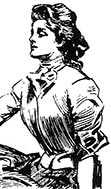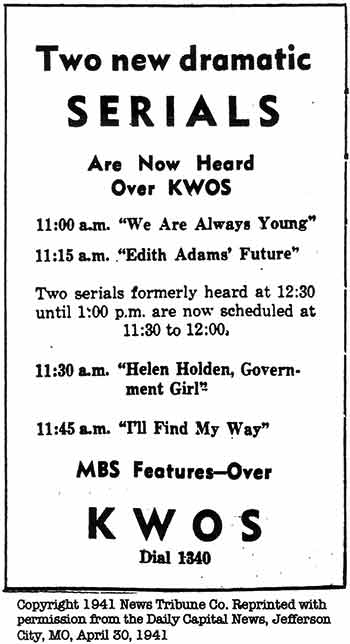|

This story was published in Radio Recall, the journal of the Metropolitan Washington Old-Time Radio Club, published six times per year.
Click here to return to the index of selected articles.
|
|
MUTUAL'S FORGOTTEN SOAP OPERAS:
How MBS Blew Tentative Soap Bubbles
with Station-Produced Sustainers
|
 |
by Karl Schadow, © 2006
(From Radio Recall, April 2006) |
 |
The Mutual Broadcasting System was well known for its mystery dramas, musical, news and sports programming, however, its forte was not daytime serials. At a January 1941 meeting, program directors attempted to change that situation with an innovative experiment: station-produced soap operas. It was the hope that these would eventually acquire sponsorship so that Mutual would establish a niche in this lucrative market, previously and steadfastly held by CBS and NBC-RED.
Four programs were chosen that would be aired consecutively during the 1 O'Clock hour, Eastern Standard Time to commence February 24, 1941. These were: We Are Always Young, Edith Adams Future, Helen Holden-Government Girl, and I'll Find My Way. It is the goal of this essay to provide a brief synopsis for each of these serials which would encourage future research and bring these serials into the realm of the better-known washboard weepers. Those legendary serials on CBS which provided the competition consisted of: Life Can Be Beautiful, Women in White, Right to Happiness and Road of Life. In its own 1:45 p.m. slot, NBC-RED countered with Betty & Bob.
Along with the sustaining nature, each serial was aired uniquely, six days per week which included Saturday. The one hour block worked well in most markets. When Daylight Savings Time arrived two months into the experiment, those stations not airing all (or even any) of the serials were now able add these to their schedules. KWOS in Jefferson City, Missouri is a good example. (See accompanying ad.) Mutual outlets which were also members of the Colonial Network aired the quartette at 9:30 a.m. each day. Stations of the Don Lee Network satisfied listener interest by airing the four each day via transcription although not always in a solid block.
WE ARE ALWAYS YOUNG
Produced at WOR in New York, this opener was written by Ashley Buck and Nicholas Cosentino. The story featured musical composer Gary Haven, played by William Janney who came to New York in an attempt to sell a symphony, but who is making a living as a cab driver. Producer/Director Robert Lewis Shayon selected a supporting cast from stage and screen: Linda Watkins (Dawn-singer), Jessie Royce Landis (Gloria), Joe Laurie, Jr., (Sniffy-whimsical gangster), Pert Kelton (Lolita-hat check girl), Joe Granby (Mead Conners), Anthony Ross (Slick Martin), Donald Cook and also Alexander Kirkland (William Standish), Bedelia Falls (cigarette girl), Nick Long, Jr., (broadway hoofer), Sarah Burton (debutante), Martha Sleeper, Horace Braham, George Coulouris, Mona Moray, Zita Johann and William Harrigan. Of note is that one of radio's finest actors, Jackson Beck was cast as the McCarthy brothers, Cicero and Fennimore.
In the one extant episode of this drama (July 25, 1941), Lolita is comforting Sniffy in his hotel room following his rough night on-the-town. Mead Conners and Gary enter midway through the stanza to inform the two that Gary's all but finished symphony is locked tight in Mead's safe. Sniffy had mistakenly taken sleeping pills earlier and is heard snoring away as the episode closes. There was a running inside joke amongst the cast as to who was going to get the last line in each episode. Gagman Laurie, Jr. won out once again. This serial's comedic element was rare in daytime radio and contributed much enjoyment.
It's currently unknown if Gary ever published his symphony. However, another musical composition was published, a ballad, Face in the Crowd which was actually composed by Janney's father (Russell Janney) and Franklin Hauser. It played an integral part on the serial and was subsequently performed by orchestras nationwide. It was rare indeed when a popular song was borne from a daytime radio serial.
During the closing of each episode, announcer Len Sterling returned the microphone to the cast so that members could identify themselves in character, a most novel and appropriate tribute. This practice continued throughout the entire run of this serial which ended Saturday, November 22, 1941.

EDITH ADAMS' FUTURE
Originating from WKRC in Cincinnati, "The story of Edith Adams' Future, the story of a woman past 35 forced to a brutal awakening to a world that had passed her by while she played beautiful wife to a domineering husband. Her story proves that beauty and a courageous zest for life are not to the young alone but belong eternally to the young in heart." Edith (Della Louise Orton) was married to a man many years her senior (Joseph Harding) to give her teen-age daughter Janey (Mary Lou Lantz) a home. Unfortunately, this second marriage also did not last. Edith is helped through these troubled times by her best friend Cissy (Dolores Dahl). Others in the cast included: Lin Mason, Bob Middleton and Jimmie Scribner.
One of the last episodes aired (July 25, 1941) is available for review. Cissy and Jim Barkley (Syd Cornell) are at Jim's ranch discussing their respective abodes and his feelings toward Edith when she walks in with the morning mail. Cissy departs and we find Edith informing Jim that she has not heard from another serious suitor, Jeff Lindsay owns a large farm back in the East. As the episode ends we wonder what is to become of her relationship with Jim. Will she receive any word from Jeff?
Garnett Marks, who was still emoting the "new serial" aspect was the announcer in this particular episode while Johns Adams filled the role when the serial started. Brad Simpson was the series director with Syd Cornell producer. Scripts were written by Cincinnati-native Frances Swing, cousin of Mutual newscaster Raymond Graham Swing.
The serial had the briefest life of the four and continued six days per week until an AFRA strike at WKRC forced it off the air at the end of July, 1941. As of Monday, June 23,1941 it aired at 11:45 a.m. continuing on most stations. However, these last few weeks were not heard over WOR or WGN. Helen Holden-Government Girl moved up to the 1:15 p.m. slot. Ironically, a sponsored serial, Front Page Farrell took over at 1:30 p.m.
HELEN HOLDEN-GOVERNMENT GIRL
Contrary to the current dogma, Helen Holden was not a federal agent or G-Woman but a worker at a still to be ascertained government agency. The script was penned by Dan Beattie and Frank Blair. The latter also served as producer/director and announcer. Starting on Monday, December 9, 1940 as a local program on WOL, the story told of drama, intrigue and romance in Washington, DC.
The first episode which was replayed when the serial started the network run found Helen (Nancy Ordway) arriving in Washington from the Midwest to visit her Aunt Mary (Nell Fleming). Mary's dear friend David Bailey (Robert Pollard) immediately grows quite fond of Helen much to the dismay of Mary who is in love with him. Others in the cast included: Rudolph Justice Watson, Linda Carroll, Larry Geraghty, Evelyn Freyman and Lee Warren. Organ music was provided by Tommy Watson. The control operator was Bill Cornell.
By March 1, 1941, the end of the initial week of the network run, the program had its first guest with stage actress Doris Nolan. Actors Larry "Buster" Crabbe and Lyle Talbot also appeared later in the series. There were band leaders (Horace Heidt and Johnny Long), Mutual moderators/ commentators (Theodore Granik and Fulton Lewis, Jr.), a movie mogul-Jesse Lasky, even a United States Senator from North Carolina, Robert Reynolds. In a reciprocal exchange, Frances Brunt (who assumed the lead in June 1941) and Larry Geraghty appeared on Double or Nothing a few months after the quiz show's host, Walter Compton had a made a visit.
All the guests played themselves in the serial and told about their various vocations. Although this may have helped in boosting the serial's ratings over that of its three companions, by the time the US had entered W.W.II, Variety bemoaned that "..story and entertainment had been abandoned for a propaganda shill..." By February 1942, a Red Cross theme had been developed. Did Helen join this organization? This and many other questions await to be answered. Although the Saturday episodes had ceased in November 1941, the serial continued as a five-a-week drama ending on March 20, 1942.
I'LL FIND MY WAY
The longest tenure of the four, I'll Find My Way debuted in the 1:45 p.m. slot on March 3, 1941, one week later than its three sister serials. Although not always aired in New York or Chicago, this drama ran continuously until November 6, 1942. Emanating from the studios of WGR/WKBW of the Buffalo Broadcasting Corporation (BBC), it was written by Joe Slotkin and BBC program director Herbert Rice. It featured Phyllis Jeanne Creore, who was enticed to leave New York radio by the program's producer/director Rice to star as Liz Landers, an aspiring actress whose career was curtailed by the illness of her father (Jack Preston), owner of a small-town newspaper.
The paper's printer was portrayed by Arthur Schmidt while Leonard Sherer had the role of the family doctor. Billy Keaton was a city slicker trying to gain control of the paper. The heroine persevered through these and many other harrowing personal experiences as well as those involving her kid brother Harvey. By 1942, she was a production chief of a radio station.
By June 1941, another New York actor, Miriam Wolfe had also ventured to Buffalo to assume the lead. According to fellow Let's Pretend cast member Arthur Anderson, Miriam was paid $50/week for the role. One year later, she was still making the same salary but also engaged as a DJ, and also in producing and writing at the BBC. She continued to commute weekly to New York to appear in Let's Pretend. In June 1942, she returned once again to New York to stay.
At this time, the serial shifted format with Vicki Mason as one of the new lead characters played by Elsie Jane Pfeil. What transpired over the next six months of this drama is yet to be determined. Additional members of the BBC guild who participated were: Arlene Brock-Levitt, Polly Wiggins and Joe Abels. The theme music composed by two Buffalo tune smiths, Cal Janis and Bernard Simon was published giving a second serial that grand distinction.
The four serials outlined above never attracted a sponsor, and were never mentioned in the Ten Year History published by the Network in 1944. However, the concept was unique and the serials deserve a better fate than most of the obscure OTR programs.
AUTHOR’S FOOTNOTE: I have a great more material on Mutual’s soaps, but space would not permit here. Phyllis Creore is still living in New York and I talked with her on the phone last month. Besides being the lead on I'll Find My Way, she was on 15 other programs in Buffalo, sang on some, did a consumer show, etc. She has attended FOTR Newark received an award for Canteen Girl. Ironically, in Fall 1941, Hecker sponsored This is Life, which took Mon.-Wed.-Fri. from We Are Always Young. Why Hecker didn't plug the serial is unknown.
|